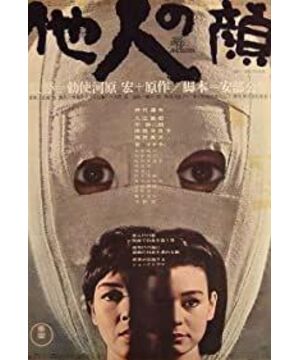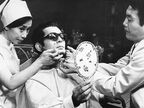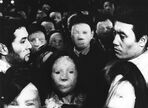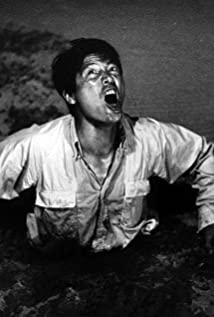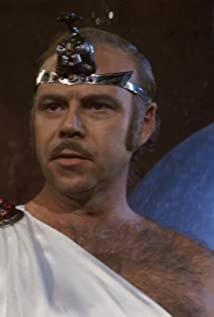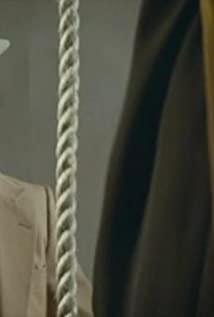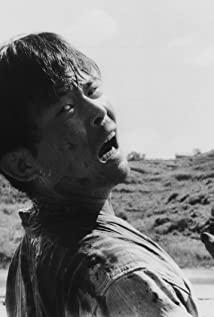1. The doctor's purpose
Okuyama repeatedly asked the doctor "what is your real purpose" before and after obtaining the mask. Every time the doctor used "experiment" as an excuse to prevaricate the past, making people think that he was just out of pure human spirit. Curiosity hides real motives. To understand a doctor's motives one must start with the doctor's wife.
The doctor's wife is never seen face-to-face in the film, she is only mentioned in the dialogue between the doctor and the nurse, and then her profile and hair begin to appear in the background of the clinic in a surreal way. When the doctor received a call from the police station, her voice suddenly came out and said, "Dinner is ready."
The doctor and nurse were clearly having an affair, and the affair was being carried out secretly under the pervasive watch of his wife. The doctor's wife is not cast as a character, but as an "other." Under the gaze of this "other", the doctor felt unfree, and it was this understanding of "freedom" that prompted him to create a mask to escape this gaze and the self focused on this gaze. The desire for identity. What's interesting about this experiment, as he puts it himself, is that he will help Okuyama become an "invisible man" in social relationships. This is the starting point of the whole film. Because it was the doctor's misunderstanding of "freedom" that contributed to Okuyama's tragedy. As a psychiatrist, he certainly understood the danger of this experiment, so he chose Okuyama to experience this "dangerous freedom" instead of him. Not to mention the whole thing brought a creator-like pleasure to the doctor.
However, Okuyama, who was the subject of the experiment, did not want to be an "invisible man". At least initially, masks meant different things to the doctor and Okuyama. Before setting off on leave, Okuyama asked the doctor, "Do you know what I'm thinking in the room?" The doctor replied, "What about taking all your freedom?" However, Okuyama never thought about the "freedom" of being an invisible person in society. Instead, he is desperate to get revenge on his wife by gaining a definitive new identity. What he considers is "jealousy," a tangible relationship. This has to do with Okuyama's perception of himself. Ordinary people will always believe that they are something in everyday situations. If the self-construction must be established through the "other", such as through the image in the mirror in childhood, through the facial expressions of the parents as the mediator, we always know ourselves through the mirror image of others, then after the disfigurement, Okuyama The whole perception of oneself is broken. Unable to identify himself in others, he sees himself as a "monster". For him the mask (a human face) means the rebirth of "I", the rebirth of social relations. He needed a new face to restore the Gestalt picture of the gestalt of the ego.
2. Seeing and Peeping
Among the various ways to gain access to the world, “seeing” is always the most special and the most important way. It is impossible to consciously "see," or gaze, without being mingled with at least one of judgment, understanding, and emotion. That is to say, the process of "seeing" is the projection of the self, which is to incorporate the object to be seen into the world understood by oneself, but at the same time, it also creates a sense of distance from the object to be seen. "See" empowers. Smell, hearing, and touch don't provide the "feeling of control" that vision does.
One more mention of the relationship between the doctor, the nurse, and the doctor's wife. About 35 minutes later, a nurse went to make coffee, and when she came back, she whispered to the doctor: "Your wife is listening again." This is the first time "wife" is mentioned, revealing her surveillance of doctors, but also showing that her every move is being watched by nurses. That is to say, in the relationship of "seeing", they are equal. The video shows this: the nurse walked towards the front of the camera, and suddenly her back also appeared in the foreground at the same time, proving that what the camera just shot was the image in the mirror. At this time, she hesitated for a while, and from the expression, she found that the doctor's wife was eavesdropping, and the scene cut to the next second had no mirror in front of the nurse making coffee. This switch makes it easier for the audience to notice the previous mirror image, and the simultaneous appearance of the abrupt frontal back image is just a hint that she is peeping and being peeped at the same time.
It seems that Okuyama asked the doctor to put a mask on him, but the doctor also chose Okuyama because he found that Okuyama had "something that other patients cannot experience", that is, before wearing the mask, Okuyama put others The identified me is regarded as "not me". Everyone knows who Okuyama is, but Okuyama himself doesn't. The company secretary recognized Okuyama, but Okuyama himself rejected the recognition. He asked, "How do you know if the person under the bandage is me?" He refused to recognize himself in the eyes of others, and even looked at him with hatred. If possible, he wanted to "put out all the lights in the world, or goug out all the eyes". The power relationship between Okuyama and the world has become unbalanced, and as a weak man, he feels that he has to seek more power from the world. It is only safe for him not to be "watched" while he is "seeing". This is the difference between looking and peeping in general. The voyeur must conceal himself to maximize the power of "seeing". He mentioned to his wife that he was observing a man and a woman in front of him in the darkness of the cinema, and he had tried to peek through the keyhole to watch his wife take a bath, but this attempt was frustrated by his moral sense in introspection.
The twisted pleasure of voyeurism is not what Okuyama wants, at least in this period, what he wants is to restore an equal relationship with the world without sacrificing self (self-esteem). As he himself said, it was more important for him to "go back" (to restore relationships) than to "leave" (to leave relationships altogether). Whether it's saying "I'm going to burn my wife's face like mine," or eagerly wanting a new identity through a mask to "make my wife jealous," it's a hope that the relationship of "seeing" can be reciprocal. On the night the mask was put on, that wish was fulfilled. The doctor said to Okuyama, "You are no longer afraid of light", "When the waitress walked by, your eyes were on her legs."
And it is in order to maintain this equality that Okuyama must embrace this new face with all his heart, not just as a mask, which restores the integrity of his self. Only in this way can he convince himself that he is "seeing" the "I" with a new face, not the voyeuristic self hidden under the mask. He was even well prepared for the equivalent of "being seen". With a new face, he began to keep looking at himself in the mirror. This is the initial establishment of this new self. After that, he couldn't wait to buy new clothes that matched his face, changed his living habits and even his personality, all to adapt to this new "me". And unintentionally. The doctor's warning that "you are being led away by new faces" is true but also Okuyama's original wish. And the doctor's gaze made Okuyama uneasy, because it was the only gaze that could penetrate the mask. The doctor kept reminding him that "a mask is a mask, you are you" ("I said that wearing a mask is like jumping into zero gravity, but you insist on defining it. Now where will it take you?" ). From the night he put on his face, he was eager to drive the doctor away. But driving away the doctor at this moment and killing the doctor in the end are not from the same psychology. At this moment, the only reason to drive away the doctor is to fully occupy the new identity given by the mask.
At first Okuyama was frightened to find that the landlord's mentally handicapped daughter could recognize him, but after the doctor's revelation, he was relieved. Because the landlord's daughter is not "looking" at the face under his mask, the way she identifies the world has nothing to do with "seeing" and "being seen." She is outside this power relationship.
Seeing empowers the viewer, but at the same time creates a sense of distance in which consciousness is permanently separated from the object. Although the mask helped Okuyama regain an equal eye with the world, from the moment he put on the mask, he felt that the world was unfamiliar and unrealistic. He couldn't feel the wind on his face. Various deep relationships in the world have been simplified into seeing and being seen. As the doctor said, there are no more friends and lovers, trust and betrayal. The mask denies the possibility of the individual blending into the other and becoming a member of the collective. And it is the ignorance of this limitation of the mask that Okuyama disastrously challenges his new identity, trying to seduce his wife to avenge her.
3. Makeup, Love and Games
Regarding makeup, Mrs. Okuyama said two things
: 1. In "The Tale of Genji", it is considered noble for women to hide their faces
2. Women have never concealed the fact that they make up.
Mrs. Okuyama has never disliked the appearance of Okuyama's disfigurement. In the first half of the film, she repeatedly persuaded Okuyama to remove the bandages that were unhealthy. When Okuyama raided her in the dark wearing a bandage, she pushed him away not because she hated or rejected him, but because she knew the joy of love better than Okuyama. What she refuses is Okuyama making love to her in a power-seeking way. Okuyama raided her not out of love for her, but simply to seek proof from her: not even proof of his existence as a husband, but proof that his identity as a husband no longer existed.
Mrs. Okuyama felt guilty and apologetic after realizing that her gesture of refusal had inadvertently hurt her husband, and in a later conversation she tentatively asked him if he wanted to turn off the lights again, which she hoped to make up for the last refusal. She wants him to try again, but Okuyama stubbornly thinks he's proven himself and has an excuse to get a new identity to avenge her without needing to prove anything.
So Mrs. Okuyama came up with the idea of makeup: The women in "The Tale of Genji" consider it noble to cover up their faces. This is actually because make-up acts as a shield to avoid a stark viewing relationship. She actually wanted to save her husband from the dilemma of fear of being "seen". However, Okuyama only regards makeup as a means for women to please the opposite sex, and feels that his wife's request is an irony to himself.
What's more, for Mrs. Okuyama, make-up and face-covering bandages are completely different things. Bandages completely refuse to watch, while makeup—“women never hide the fact that they wear makeup”, although makeup hides their true faces, it presents an inviting gesture—inviting the other party to explore this place in the mist, The "I" that cannot be seen clearly. The best part of eroticism is the game, not showing nakedness, but exploring the unshown. Mrs. Okuyama understood this very well, so when she "ran into" her husband who changed his face and came to chat with her on the road, she also put on heavy makeup to cooperate with him to continue the game. In her mind, it was an effort by the husband and wife to restore their passion, so she later said she was "ashamed and grateful" at the time. That's exactly what happened, when Okuyama took off his mask in front of her and slammed her head down: it turned out that there was no invitation in his mask, and what's worse, the way he made love to her was still power-seeking. , there is no love here, only the desire for revenge to overcome her and humiliate her in a power relationship.
4. The desperate situation of "freedom" to escape from the other
When Mrs. Okuyama regarded the mask as a part of role-playing, she did not think that Okuyama was not acting, but living as the mask. So when she was disappointed, she decided to say "What I can't stand is pretending that a mask is real". Okuyama should have been content with the equal relationship between him and her restored by the mask, but found that he wanted far more than he thought. At the moment when he took off his mask, he didn't feel any sense of revenge, what he experienced was a deep loss. Why does he yell "It's so easy! It's so easy! I can't take it"? Because he didn't realize that he didn't really want to humiliate his wife, he was expecting her rejection. What he wanted was something deeper than gaining her and declaring her rights: her loyalty and love for him. This is not attainable by his existence as a mask, for which he must tear off the mask.
But the very act of tearing off the mask had disastrous consequences. The mask has long replaced the face under the mask as Okuyama himself. After realizing his wife's intentions, he asked to put on a mask and have sex with her again, but she categorically refused. She refuses to recognize this new him, and Okuyama, reborn with the help of a mask, and his re-established relationship with the world collapses with it. My favorite shot of this movie is when he sits alone in an empty room, with his mask half-uplifted and no longer human. The mask is no longer the new self, but just the mask. Okuyama is no longer Okuyama, but an existence without identity.
Okuyama, who has lost his relationship with the world, can only experience his own existence by madly appealing for power. He became a real voyeur, even more so than a voyeur. The mask filtered out all the gazes of others and cut him off from the necessity of responding to the moral calling in the eyes of others. He can do whatever he wants. That's what the doctor meant when he said "masks will utterly destroy all human morality".
At the beginning of the experiment, the doctor once said that it was a "romantic experiment" because the doctor's concept of freedom was completely romantic: to experience the vitality contained in the infinite expansion of the self, free from the bondage of others. This romantic view of freedom is brought about by the epistemological philosophy of subjectivation. After learning that he could not be saved, Okuyama's act of killing the doctor was revenge and the final self-exile, killing the last person who could see himself, and then sinking into a desperate situation with no eyes, no other's face, and no self.
View more about The Face of Another reviews


